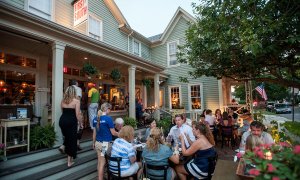
LIKE MANY PEOPLE when I reached my late teens I made some big decisions based on a few loosely connected concepts that continue to track me to the present day. I was good at writing and could do it quickly and did not care for an academic major like psychology or anthropology. The way I saw it, journalism was practical, just a craft, like being an electrician or a mechanic. It was a job that needed to be done and I had some of the right skills to do it.
There were a few hints along the way that our lives as journalists might diverge from the college-educated mainstream though. “Don’t expect to get rich from this job,” one professor said. “You’ll meet a lot of alcoholics in this business,” another confessed. “Everyone has heard about the reporter who comes back to the office after a long day on the job, pulls out the whiskey, and gets to work, and I am here to tell you, it’s true.” To me, as a 19-year-old kid who liked to drink on the weekends, journalism seemed to promise everything I could ever want — a life spent writing, a career path lubricated by liquor, and, most of all, limited responsibility. It was the perfect job for the drifter at heart, and that was me.
Yet somehow I got settled. I meandered over to the other side of the world only to fall in love with a woman. Then we got married and have had three children and acquired real estate. And all the while I was writing. I got so used to writing that I started to write even when I wasn’t getting paid. I started one blog and another and then I started this one. My poor children have grown up watching their father stare at a small rectangular screen, sometimes even in awe of the speed in which letters sprout up across it. But they hate it too. They wish they had a father who went to work somewhere and then returned from that place. Or better yet, someone who does something physical, who produces something other than content.
My eldest daughter’s friend has a boat mechanic for a father. I’ve never seen him in action, but I imagine that he is walking around a lot with tools in his hands and perhaps rubbing his forehead from time to time when a particularly ugly job comes in. “It’s a damn shame what salt water does to good vessels,” he has a habit of saying. “It just destroys them.” “The wiring?” I ask. He nods. “The wiring. Everything.” Sometimes he goes to training courses in New Hampshire to learn about lake boating and kick it with other boat mechanics. The kids come too and they stop at the aquarium in Mystic, Connecticut, along the way. It all seems very nice.
My daughter senses this niceness too, which is why the other day while I was checking my email in the car she said, “Daddy, why can’t you just get a normal job?”
“A normal job?” I set down my device. “But being a journalist is a normal job.”
“No, it isn’t.”
“It isn’t?”
“No.”
“Well, what kind of job do you think I should get?”
“Why not be a boat mechanic?” she said and shrugged. “Jenny’s dad does that. He seems to like it.”
A boat mechanic? I thought. Only on the North Fork. Anywhere else and your kid would ask you to be a doctor or a restaurant owner. But on the North Fork, ask a child for a career option and she’s bound to mention something to do with boats or vineyards. And it’s not just Jenny’s Dad. Angie’s parents run a dock-building business. And Nate’s dad owns a berry farm.
“But I didn’t go to school to become a boat mechanic,” I said. “I went to school to become a journalist.”
“Are you serious? They actually have schools for that?”
“They do. And I don’t think I’d be a very good boat mechanic anyway. I’d probably screw the boats up more. They’d sink.”
She thought for a moment. “Yeah, you probably would,” she said. “But maybe you could try and write a little bit less sometimes. Okay Daddy?”
“Okay,” I said. “I’ll try.”

